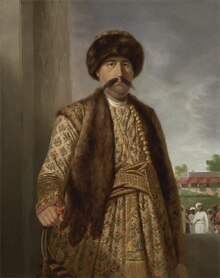Shuja-ud-Dowlah
| Shuja-ud-Daulah | |
|---|---|
|
Nawab Wazir of Oudh Nawab Wazir al-Mamalik Wazir ul-Hindustan (Prime Minister of India) Subedar of Kashmir, Agra & Oudh Khan Bhadur Asad Jang Arsh Manzil |
|

Nawab of Oudh Shuja ud Daulah
|
|
| Reign | 1753–1775 |
| Predecessor | Safdarjung |
| Successor | Asaf-Ud-Daula |
| Spouse(s) | Begum Unmatuzzohra Bano "Bahu Begum" |
|
Full name
Jalal-ud-din Haider Abul Mansur Khan Shuja-ud-Daulah
|
|
| Father | Safdarjung |
| Born |
January 19, 1732 Mansion of Dara Shikoh, Delhi |
| Died | January 26, 1775 Faizabad |
| Buried | Gulab Bari, Faizabad |
| Religion | Islam |
| Military career | |
| Allegiance |
|
| Service/branch | Nawab of Oudh |
| Rank | Subadar, Grand Vizier, Nawab |
| Battles/wars | Mughal-Maratha Wars, Third Battle of Panipat, Battle of Buxar |
Shuja-ud-Daulah (Hindi: शुजा उद दौला, Urdu: شجاع الدولہ) (b. January 19, 1732 – d. January 26, 1775) was the Subedar Nawab of Oudh from 5 October 1754 to 26 January 1775,
Though a minor royal, he is best known for his key roles in two definitive battles in Indian history - the Third Battle of Panipat which temporarily halted Maratha domination of the northern regions of the Mughal Empire and overthrew Shah Jahan III and reaffirmed Shah Alam II as the rightful emperor of the Mughal Empire. He had allied himself with Mir Qasim and took part in the Battle of Buxar, which ended in defeat.
Shuja-ud-Daulah was the son of the Mughal Grand Vizier Safdarjung chosen by Ahmad Shah Bahadur. Unlike his father Shuja-ud-Daulah was known from an early age for his abilities to synthesize his subordinates, this skill would eventually cause him to emerge as the chosen Grand Vizier by Shah Alam II.
...
Wikipedia
